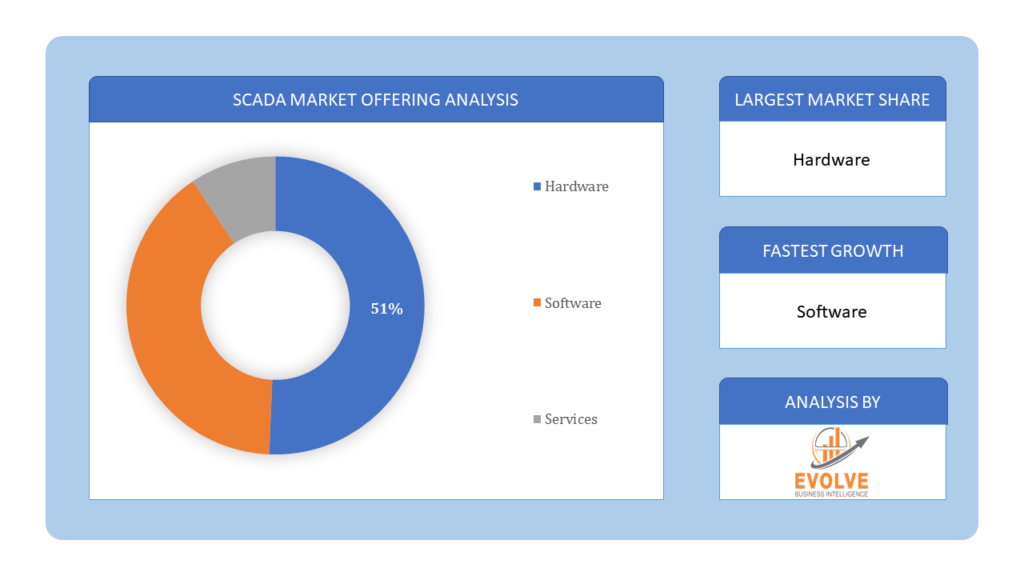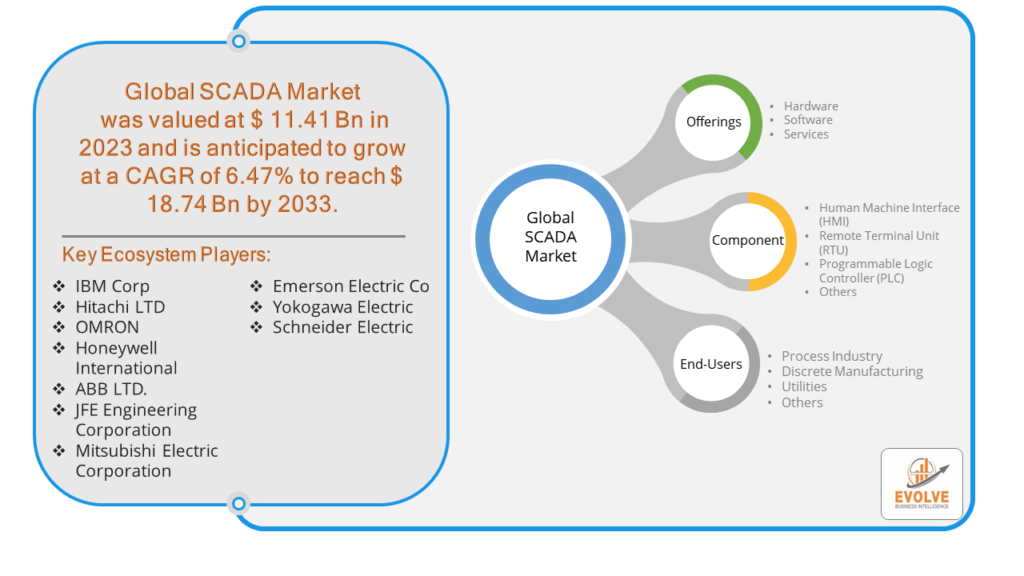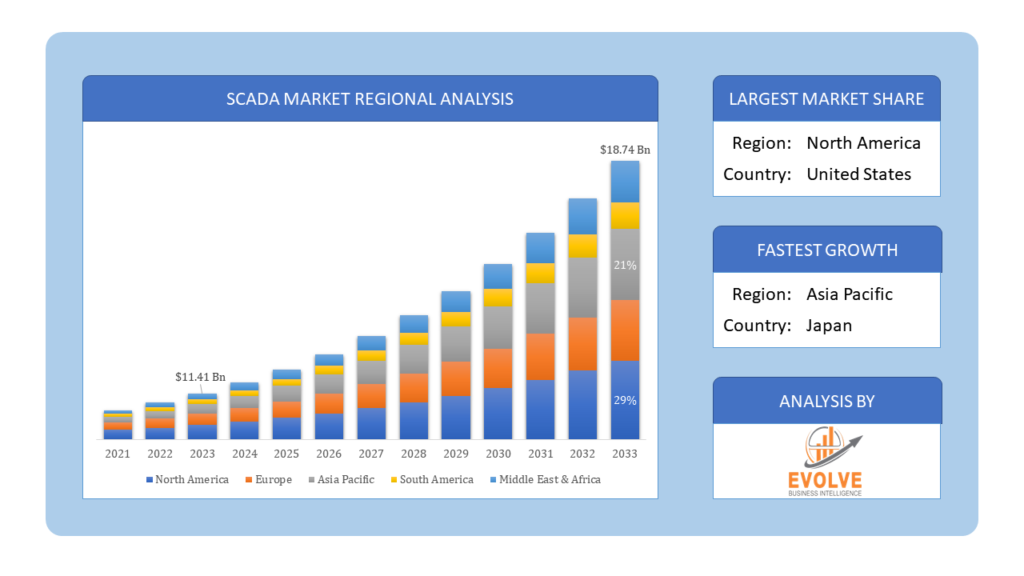SCADA Market Analysis and Global Forecast 2023-2033
$ 1,390.00 – $ 5,520.00Price range: $ 1,390.00 through $ 5,520.00
SCADA Market Research Report: By Offering (Hardware, Software, Services), By Component (Human Machine Interface (HMI), Remote Terminal Unit (RTU), Programmable Logic Controller (PLC), Others), By End User (Process Industry, Discrete Manufacturing, Utilities, Others), and by Region — Forecast till 2033
Page: 165
SCADA Market Overview
The SCADA Market Size is expected to reach USD 18.74 Billion by 2033. The SCADA industry size accounted for USD 11.41 Billion in 2023 and is expected to expand at a compound annual growth rate (CAGR) of 6.47% from 2023 to 2033. An industrial organization’s ability to monitor, collect, and process real-time data, and to operate industrial operations locally or remotely, is made possible by the SCADA system, which consists of hardware and software components. Additionally, it enables end users to report events into a log file and interact directly with equipment such as valves, sensors, pumps, and motors using human-machine interface (HMI) software. The need for industrial SCADA systems is always rising since these systems keep operations running smoothly, process data to enable wiser decisions, and notify system problems to save downtime. Also, continuous technical developments in SCADA, brought about by creative efforts from market participants, have further improved the system’s effectiveness, creating market opportunities.
Global SCADA Market Synopsis
COVID-19 had a negative impact on practically all sectors across the globe, due to supply chain disruptions and other industrial operations difficulties. The majority of businesses have either stopped all manufacturing or only do the bare minimum. In the early stages of the pandemic, governments’ responses to COVID-19, such as lockdowns and social seclusion, resulted in the shutdown of production and processing facilities. The demand for numerous input items in the industrial sector has drastically decreased since relatively few industrial operations are permitted. Given that relatively few new SCADA systems are anticipated to be implemented by these businesses during the continuing crisis, the aforementioned considerations seem essential to have an impact on the SCADA market.
Global SCADA Market Dynamics
The major factors that have impacted the growth of SCADA are as follows:
Drivers:
⮚ Increased Use of Cloud-Based SCADA Systems
The purpose of implementing an industrial SCADA system is to manage and keep an eye on the facility’s installed transmitters and sensors. With the aid of an HMI, a user or controller manages the applications. Operators can manage applications online thanks to the combination of a SCADA system with cloud computing technology. Additionally, cloud-based SCADA systems have gained in popularity over time due to their many advantages, including scalability, ease of updating and retrieving files, and upgrading via the cloud.
Restraint:
- High investment is required for SCADA system installation and maintenance
There is a high investment required for SCADA system installation and maintenance that restrain the growth of the market. The cost of the SCADA system can be divided into two parts. One is the cost of hardware and software and the other is the cost of installation, training, and maintenance. For large systems, the cost of hardware can range from a few hundred thousand dollars to a few million dollars. The cost of software can be 20 to 30% of the hardware cost. The cost of installation, training, and maintenance can be 10 to 20% of the hardware cost.
Opportunity:
⮚ An increase in big data analytics
Massive development in big data and analytics has boosted the effectiveness of SCADA systems, opening up a wide range of industry potential. Analytical software solutions assist businesses in reducing errors, enhancing decision-making, and locating the source of issues. As a result, more sectors have started using these technologies to create decision-making processes. Analytics tools are now being used by automation suppliers in SCADA and advanced process control (APC).
SCADA Market Segment Overview
By Offerings
 Based on the Offering, the SCADA market is segmented based on Hardware, Software, and Services. A significant portion of the global SCADA market is anticipated to belong to the services segment. The increased demand for services that provide supervisory automation control and data acquisition end users with better efficiency, high reliability, and greater visualization is credited with driving this market growth.
Based on the Offering, the SCADA market is segmented based on Hardware, Software, and Services. A significant portion of the global SCADA market is anticipated to belong to the services segment. The increased demand for services that provide supervisory automation control and data acquisition end users with better efficiency, high reliability, and greater visualization is credited with driving this market growth.
By Component
Based on the Component, the SCADA market is segmented based on Human Machine Interface (HMI), Remote Terminal Unit (RTU), Programmable Logic Controller (PLC), and Others. An RTU is an electrical device that is one of the basic components of a SCADA system. It gathers information, converts it to a highly communicable format, and sends it to the primary program. This is accomplished by utilizing multiple RTUs in a SCADA system.
By End User
Based on End User, the SCADA market is segmented based on Process Industry, Discrete Manufacturing, Utilities, and Others. The Discrete Manufacturing segment is the largest contributor to the global SCADA market. This segment is expected to grow at a significant rate during the forecast period. The demand for SCADA systems in the discrete manufacturing sector is driven by the need for real-time data and process automation. These systems help discrete manufacturers to optimize their production processes and reduce downtime.
Global SCADA Market Regional Analysis
Based on region, the market has been divided into North America, Europe, Asia-Pacific, the Middle East & Africa, and Latin America. The area of Asia Pacific is anticipated to dominate the market for the usage of SCADA, followed by those in North America and Europe.
 SCADA Asia Pacific Market
SCADA Asia Pacific Market
Asia Pacific dominates the SCADA market. The vast majority of SCADA installations in the Asia Pacific region are in the energy sector, where they are used to monitor and control power plants, transmission and distribution networks, and oil and gas pipelines. The region’s growing industrial sector is also a major user of SCADA systems, deploying them in factories, water and wastewater treatment plants, and other industrial facilities. Government investment in infrastructure development is a key driver of SCADA market growth in the Asia Pacific region.
SCADA Asia Pacific Market
The Asia-Pacific region has been witnessing remarkable growth in recent years. North America is expected to soar at a CAGR of SCADA market. This region is home to some of the world’s leading industrial and energy companies, which are increasingly turning to SCADA systems to improve efficiency and safety. SCADA systems are also being adopted in a range of other industries, such as transportation and healthcare. With the rise in industrial and infrastructure projects, the demand for SCADA systems is expected to continue to grow
Competitive Landscape
The competitive landscape includes key players (tier 1, tier 2, and local) having a presence across the globe. Companies such as IBM Corp, Hitachi LTD, OMRON, Honeywell International, and ABB LTD. are some of the leading players in the global SCADA Industry. These players have adopted partnership, acquisition, expansion, and new product development, among others as their key strategies.
Key Market Players:
- IBM Corp
- Hitachi LTD
- OMRON
- Honeywell International
- ABB LTD.
- JFE Engineering Corporation
- Mitsubishi Electric Corporation
- Emerson Electric Co
- Yokogawa Electric
- Schneider Electric
Key development:
In October 2020, Progea Group was acquired by Emerson Electric. The acquisition makes it possible to expand Emerson’s embedded software and control portfolio by incorporating Progea’s analytics, industrial visualization, and Internet of Things capabilities.
In August 2020, Schneider Electric created the next-generation EcoStruxure Power platform, which digitizes, optimizes, and simplifies electrical distribution networks to make them safer, smarter, and faster.
Scope of the Report
Global SCADA Market, by Offerings
- Hardware
- Software
- Services
Global SCADA Market, by Component
- Human Machine Interface (HMI)
- Remote Terminal Unit (RTU)
- Programmable Logic Controller (PLC)
- Others
Global SCADA Market, by End User
- Process Industry
- Discrete Manufacturing
- Utilities
- Others
Global SCADA Market, by Region
- North America
- US
- Canada
- Mexico
- Europe
- UK
- Germany
- France
- Italy
- Spain
- Benelux
- Nordic
- Rest of Europe
- Asia Pacific
- China
- Japan
- South Korea
- Indonesia
- Austalia
- Malaysia
- India
- Rest of Asia Pacific
- South America
- Brazil
- Argentina
- Rest of South America
- Middle East & Africa
- Saudi Arabia
- UAE
- Egypt
- South Africa
- Rest of Middle East & Africa
| Parameters | Indicators |
|---|---|
| Market Size | 2033: $18.74Billion |
| CAGR | 6.47% CAGR (2023-2033) |
| Base year | 2022 |
| Forecast Period | 2023-2033 |
| Historical Data | 2021 |
| Report Coverage | Revenue Forecast, Competitive Landscape, Growth Factors, and Trends |
| Key Segmentations | Offerings, Component, End User |
| Geographies Covered | North America, Europe, Asia-Pacific, Latin America, Middle East, Africa |
| Key Vendors | IBM Corp, Hitachi LTD, OMRON, Honeywell International, ABB LTD., JFE Engineering Corporation, Mitsubishi Electric Corporation, Emerson Electric Co, Yokogawa Electric, Schneider Electric |
| Key Market Opportunities | • An increase in big data analytics |
| Key Market Drivers | • Increased Use of Cloud-Based SCADA Systems |
REPORT CONTENT BRIEF:
- High-level analysis of the current and future SCADA Industry trends and opportunities
- Detailed analysis of current market drivers, restraining factors, and opportunities analysis in the future
- Historical market size for the year 2021, and forecast from 2023 to 2033
- SCADA market share analysis for each segment
- Competitor analysis with a comprehensive insight into its product segment, financial strength, and strategies adopted.
- Identifies key strategies adopted by the key players including new product development, mergers and acquisitions, joint ventures, collaborations, and partnerships.
- To identify and understand the various factors involved in the global SCADA market affected by the pandemic
- To provide year-on-year growth from 2022 to 2033
- To provide short-term, long-term, and overall CAGR comparison from 2022 to 2033.
- Provide Total Addressable Market (TAM) for the Global SCADA Market.
Press Release

Global Pharmaceutical Manufacturing Market to Reach $1.38 Trillion by 2035 with 7.35% CAGR, New Research Shows

The Global Mammography Market Is Estimated To Record a CAGR of Around 10.29% During The Forecast Period

Glue Stick Market to Reach USD 2.35 Billion by 2034

Podiatry Service Market to Reach USD 11.88 Billion by 2034

Microfluidics Technology Market to Reach USD 32.58 Billion by 2034

Ferric Chloride Market to Reach USD 10.65 Billion by 2034

Family Practice EMR Software Market to Reach USD 21.52 Billion by 2034

Electric Hairbrush Market to Reach USD 15.95 Billion by 2034

Daily Bamboo Products Market to Reach USD 143.52 Billion by 2034

Cross-border E-commerce Logistics Market to Reach USD 112.65 Billion by 2034
Frequently Asked Questions (FAQ)
1.What is the study period of this market?
- The study period of the global SCADA market is 2022- 2033
2.What are the 10 Years CAGR (2023 to 2033) of the global SCADA market?
- The global SCADA market is growing at a CAGR of ~47% over the next 10 years
3.Which region has the highest growth rate in the market of SCADA?
- Asia Pacific is expected to register the highest CAGR during 2023-2033
4.Which region accounted for the largest share of the market of SCADA?
- North America holds the largest share in 2022
5.Major Key Players in the Market of SCADA?
IBM Corp, Hitachi LTD, OMRON, Honeywell International, ABB LTD., JFE Engineering Corporation, Mitsubishi Electric Corporation, Emerson Electric Co, Yokogawa Electric, Schneider Electric
6.Do you offer Post Sale Support?
- Yes, we offer 16 hours of analyst support to solve the queries
7.Do you deliver sections of a report?
Yes, we do provide regional as well as country-level reports. Other than this we also provide a sectional report. Please get in contact with our sales representatives
Table of Contents
CHAPTER 1. Executive Summary CHAPTER 2. Scope of the Study 2.1. Market Definition 2.2. Market Scope & Segmentation 2.2.1. Objective of Report CHAPTER 3. Evolve BI Methodology 3.1. Data Collection & Validation Approach 3.2. Market Size Estimation and Forecast CHAPTER 4. Exclusive Analysis 4.1. Market Opportunity Score 4.1.1. Offerings Segement – Market Opportunity Score 4.1.2. ComponentSegment – Market Opportunity Score 4.1.3. End User Segment – Market Opportunity Score 4.2. Key Market Influencing Indicators CHAPTER 5. Market Insights and Trends 5.1. Value Chain Analysis 5.1.1. Raw Material 5.1.2. Manufacturing Process 5.1.3. Distribution Channel 5.1.4. End User 5.2. Porter’s Five Forces Analysis 5.2.1. Bargaining Power of Buyers 5.2.2. Bargaining Power of Suppliers 5.2.3. Threat of New Entrant 5.2.4. Threat of Substitute 5.2.5. Industry Rivalry 5.3. COVID-19 Impact and Post COVID Scenario on SCADA Market 5.3.1. Impact of COVID-19 5.3.2. Government Support and Industry Revival Policies 5.3.3. Measures Taken by Companies to Mitigate Negative Impact 5.3.4. Post COVID Trend CHAPTER 6. MArket Dynamics 6.1. Introduction 6.2. Drivers 6.2.1. Driver 1 6.2.2. Driver 2 6.2.3. Driver 3 6.3. Restraints 6.3.1. Restraint 1 6.3.2. Restraint 2 6.4. Opportunity 6.4.1. Opportunity 1 CHAPTER 7. Global SCADA Market, By Offerings 7.1. Introduction 7.1.1. Hardware 7.1.2. Software 7.1.3. Services CHAPTER 8. Global SCADA Market, By Component 8.1. Introduction 8.1.1. Human Machine Interface (HMI) 8.1.2. Remote Terminal Unit (RTU) 8.1.3. Programmable Logic Controller (PLC) 8.14. Others CHAPTER 9. Global SCADA Market, By End User 9.1. Introduction 9.1.1. Process Industry 9.1.2. Discrete Manufacturing 9.1.3. Utilities 9.1.4 Others CHAPTER 10. Global SCADA Market, By Region 10.1. Introduction 10.2. NORTH AMERICA 10.2.1. North America: Market Size and Forecast, By Country, 2023 – 2033 ($ Million) 10.2.2. North America: Market Size and Forecast, By Offerings, 2023 – 2033 ($ Million) 10.2.3. North America: Market Size and Forecast, By Component,2023 – 2033 ($ Million) 10.2.4. North America: Market Size and Forecast, By End User , 2023 – 2033 ($ Million) 10.2.5. US 10.2.5.1. US: Market Size and Forecast, By Offerings, 2023 – 2033 ($ Million) 10.2.5.2. US: Market Size and Forecast, By Component,2023 – 2033 ($ Million) 10.2.5.3. US: Market Size and Forecast, By End User , 2023 – 2033 ($ Million) 10.2.6. CANADA 10.2.6.1. Canada: Market Size and Forecast, By Offerings, 2023 – 2033 ($ Million) 10.2.6.2. Canada: Market Size and Forecast, By Component,2023 – 2033 ($ Million) 10.2.6.3. Canada: Market Size and Forecast, By End User , 2023 – 2033 ($ Million) 10.2.7. MEXICO 10.2.7.1. Mexico: Market Size and Forecast, By Offerings, 2023 – 2033 ($ Million) 10.2.7.2. Mexico: Market Size and Forecast, By Component,2023 – 2033 ($ Million) 10.2.7.3. Mexico: Market Size and Forecast, By End User , 2023 – 2033 ($ Million) 10.3. Europe 10.3.1. Europe: Market Size and Forecast, By Country, 2023 – 2033 ($ Million) 10.3.2. Europe: Market Size and Forecast, By Offerings, 2023 – 2033 ($ Million) 10.3.3. Europe: Market Size and Forecast, By Component,2023 – 2033 ($ Million) 10.3.4. Europe: Market Size and Forecast, By End User , 2023 – 2033 ($ Million) 10.3.5. U.K. 10.3.5.1. U.K.: Market Size and Forecast, By Offerings, 2023 – 2033 ($ Million) 10.3.5.2. U.K.: Market Size and Forecast, By Component,2023 – 2033 ($ Million) 10.3.5.3. U.K.: Market Size and Forecast, By End User , 2023 – 2033 ($ Million) 10.3.6. GERMANY 10.3.6.1. Germany: Market Size and Forecast, By Offerings, 2023 – 2033 ($ Million) 10.3.6.2. Germany: Market Size and Forecast, By Component,2023 – 2033 ($ Million) 10.3.6.3. Germany: Market Size and Forecast, By End User , 2023 – 2033 ($ Million) 10.3.7. FRANCE 10.3.7.1. France: Market Size and Forecast, By Offerings, 2023 – 2033 ($ Million) 10.3.7.2. France: Market Size and Forecast, By Component,2023 – 2033 ($ Million) 10.3.7.3. France: Market Size and Forecast, By End User , 2023 – 2033 ($ Million) 10.3.8. ITALY 10.3.8.1. Italy: Market Size and Forecast, By Offerings, 2023 – 2033 ($ Million) 10.3.8.2. Italy: Market Size and Forecast, By Component,2023 – 2033 ($ Million) 10.3.8.3. Italy: Market Size and Forecast, By End User , 2023 – 2033 ($ Million) 10.3.9. SPAIN 10.3.9.1. Spain: Market Size and Forecast, By Offerings, 2023 – 2033 ($ Million) 10.3.9.2. Spain: Market Size and Forecast, By Component,2023 – 2033 ($ Million) 10.3.9.3. Spain: Market Size and Forecast, By End User , 2023 – 2033 ($ Million) 10.3.10. BENELUX 10.3.10.1. BeNeLux: Market Size and Forecast, By Offerings, 2023 – 2033 ($ Million) 10.3.10.2. BeNeLux: Market Size and Forecast, By Component,2023 – 2033 ($ Million) 10.3.10.3. BeNeLux: Market Size and Forecast, By End User , 2023 – 2033 ($ Million) 10.3.11. RUSSIA 10.3.11.1. Russia: Market Size and Forecast, By Offerings, 2023 – 2033 ($ Million) 10.3.11.2. Russia: Market Size and Forecast, By Component,2023 – 2033 ($ Million) 10.3.11.3. Russia: Market Size and Forecast, By End User , 2023 – 2033 ($ Million) 10.3.12. REST OF EUROPE 10.3.12.1. Rest of Europe: Market Size and Forecast, By Offerings, 2023 – 2033 ($ Million) 10.3.12.2. Rest of Europe: Market Size and Forecast, By Component,2023 – 2033 ($ Million) 10.3.12.3. Rest of Europe: Market Size and Forecast, By End User , 2023 – 2033 ($ Million) 10.4. Asia Pacific 10.4.1. Asia Pacific: Market Size and Forecast, By Country, 2023 – 2033 ($ Million) 10.4.2. Asia Pacific: Market Size and Forecast, By Offerings, 2023 – 2033 ($ Million) 10.4.3. Asia Pacific: Market Size and Forecast, By Component,2023 – 2033 ($ Million) 10.4.4. Asia Pacific: Market Size and Forecast, By End User , 2023 – 2033 ($ Million) 10.4.5. CHINA 10.4.5.1. China: Market Size and Forecast, By Offerings, 2023 – 2033 ($ Million) 10.4.5.2. China: Market Size and Forecast, By Component,2023 – 2033 ($ Million) 10.4.5.3. China: Market Size and Forecast, By End User , 2023 – 2033 ($ Million) 10.4.6. JAPAN 10.4.6.1. Japan: Market Size and Forecast, By Offerings, 2023 – 2033 ($ Million) 10.4.6.2. Japan: Market Size and Forecast, By Component,2023 – 2033 ($ Million) 10.4.6.3. Japan: Market Size and Forecast, By End User , 2023 – 2033 ($ Million) 10.4.7. INDIA 10.4.7.1. India: Market Size and Forecast, By Offerings, 2023 – 2033 ($ Million) 10.4.7.2. India: Market Size and Forecast, By Component,2023 – 2033 ($ Million) 10.4.7.3. India: Market Size and Forecast, By End User , 2023 – 2033 ($ Million) 10.4.8. SOUTH KOREA 10.4.8.1. South Korea: Market Size and Forecast, By Offerings, 2023 – 2033 ($ Million) 10.4.8.2. South Korea: Market Size and Forecast, By Component,2023 – 2033 ($ Million) 10.4.8.3. South Korea: Market Size and Forecast, By End User , 2023 – 2033 ($ Million) 10.4.9. THAILAND 10.4.9.1. Thailand: Market Size and Forecast, By Offerings, 2023 – 2033 ($ Million) 10.4.9.2. Thailand: Market Size and Forecast, By Component,2023 – 2033 ($ Million) 10.4.9.3. Thailand: Market Size and Forecast, By End User , 2023 – 2033 ($ Million) 10.4.10. INDONESIA 10.4.10.1. Indonesia: Market Size and Forecast, By Offerings, 2023 – 2033 ($ Million) 10.4.10.2. Indonesia: Market Size and Forecast, By Component,2023 – 2033 ($ Million) 10.4.10.3. Indonesia: Market Size and Forecast, By End User , 2023 – 2033 ($ Million) 10.4.11. MALAYSIA 10.4.11.1. Malaysia: Market Size and Forecast, By Offerings, 2023 – 2033 ($ Million) 10.4.11.2. Malaysia: Market Size and Forecast, By Component,2023 – 2033 ($ Million) 10.4.11.3. Malaysia: Market Size and Forecast, By End User , 2023 – 2033 ($ Million) 10.4.12. AUSTRALIA 10.4.12.1. Australia: Market Size and Forecast, By Offerings, 2023 – 2033 ($ Million) 10.4.12.2. Australia: Market Size and Forecast, By Component,2023 – 2033 ($ Million) 10.4.12.3. Australia: Market Size and Forecast, By End User , 2023 – 2033 ($ Million) 10.4.13. REST FO ASIA PACIFIC 10.4.13.1. Rest fo Asia Pacific: Market Size and Forecast, By Offerings, 2023 – 2033 ($ Million) 10.4.13.2. Rest fo Asia Pacific: Market Size and Forecast, By Component,2023 – 2033 ($ Million) 10.4.13.3. Rest fo Asia Pacific: Market Size and Forecast, By End User , 2023 – 2033 ($ Million) 10.5. South America 10.5.1. South America: Market Size and Forecast, By Country, 2023 – 2033 ($ Million) 10.5.2. South America: Market Size and Forecast, By Offerings, 2023 – 2033 ($ Million) 10.5.3. South America: Market Size and Forecast, By Component,2023 – 2033 ($ Million) 10.5.4. South America: Market Size and Forecast, By End User , 2023 – 2033 ($ Million) 10.5.5. BRAZIL 10.5.5.1. Brazil: Market Size and Forecast, By Offerings, 2023 – 2033 ($ Million) 10.5.5.2. Brazil: Market Size and Forecast, By Component,2023 – 2033 ($ Million) 10.5.5.3. Brazil: Market Size and Forecast, By End User , 2023 – 2033 ($ Million) 10.5.6. ARGENTINA 10.5.6.1. Argentina: Market Size and Forecast, By Offerings, 2023 – 2033 ($ Million) 10.5.6.2. Argentina: Market Size and Forecast, By Component,2023 – 2033 ($ Million) 10.5.6.3. Argentina: Market Size and Forecast, By End User , 2023 – 2033 ($ Million) 10.5.7. REST OF SOUTH AMERICA 10.5.7.1. Rest of South America: Market Size and Forecast, By Offerings, 2023 – 2033 ($ Million) 10.5.7.2. Rest of South America: Market Size and Forecast, By Component,2023 – 2033 ($ Million) 10.5.7.3. Rest of South America: Market Size and Forecast, By End User , 2023 – 2033 ($ Million) 10.6. Middle East & Africa 10.6.1. Middle East & Africa: Market Size and Forecast, By Country, 2023 – 2033 ($ Million) 10.6.2. Middle East & Africa: Market Size and Forecast, By Offerings, 2023 – 2033 ($ Million) 10.6.3. Middle East & Africa: Market Size and Forecast, By Component,2023 – 2033 ($ Million) 10.6.4. Middle East & Africa: Market Size and Forecast, By End User , 2023 – 2033 ($ Million) 10.6.5. SAUDI ARABIA 10.6.5.1. Saudi Arabia: Market Size and Forecast, By Offerings, 2023 – 2033 ($ Million) 10.6.5.2. Saudi Arabia: Market Size and Forecast, By Component,2023 – 2033 ($ Million) 10.6.5.3. Saudi Arabia: Market Size and Forecast, By End User , 2023 – 2033 ($ Million) 10.6.6. UAE 10.6.6.1. UAE: Market Size and Forecast, By Offerings, 2023 – 2033 ($ Million) 10.6.6.2. UAE: Market Size and Forecast, By Component,2023 – 2033 ($ Million) 10.6.6.3. UAE: Market Size and Forecast, By End User , 2023 – 2033 ($ Million) 10.6.7. EGYPT 10.6.7.1. Egypt: Market Size and Forecast, By Offerings, 2023 – 2033 ($ Million) 10.6.7.2. Egypt: Market Size and Forecast, By Component,2023 – 2033 ($ Million) 10.6.7.3. Egypt: Market Size and Forecast, By End User , 2023 – 2033 ($ Million) 10.6.8. SOUTH AFRICA 10.6.8.1. South Africa: Market Size and Forecast, By Offerings, 2023 – 2033 ($ Million) 10.6.8.2. South Africa: Market Size and Forecast, By Component,2023 – 2033 ($ Million) 10.6.8.3. South Africa: Market Size and Forecast, By End User , 2023 – 2033 ($ Million) 10.6.9. REST OF MIDDLE EAST & AFRICA 10.6.9.1. Rest of Middle East & Africa: Market Size and Forecast, By Offerings, 2023 – 2033 ($ Million) 10.6.9.2. Rest of Middle East & Africa: Market Size and Forecast, By Component,2023 – 2033 ($ Million) 10.6.9.3. Rest of Middle East & Africa: Market Size and Forecast, By End User , 2023 – 2033 ($ Million) CHAPTER 12. Competitive Landscape 12.1. Competitior Benchmarking 2023 12.2. Market Share Analysis 12.3. Key Developments Analysis By Top 5 Companies 12.4. Market Share Acquisition Strategies: Analysis of Key Approaches Employed by Top Players CHAPTER 13. Company Profiles 13.1. IBM Corp 13.1.1. Business Overview 13.1.2. Financial Analysis 13.1.2.1. Business Segment Revenue, 2020, 2021, 2022, $ Million 13.1.2.2. Geographic Revenue Mix, 2022 (% Share) 13.1.3. Product Portfolio 13.1.4. Recent Development and Strategies Adopted 13.1.5. SWOT Analysis 13.2. Hitachi LTD 13.3. OMRON 13.4. Honeywell International 13.5. ABB LTD. 13.6. JFE Engineering Corporation 13.7. Mitsubishi Electric Corporation 13.8. Emerson Electric Co 13.9. Yokogawa Electric 13.10. Schneider Electric
Connect to Analyst
Research Methodology








